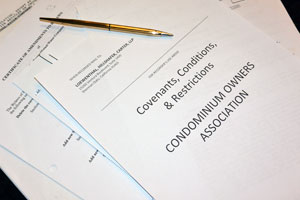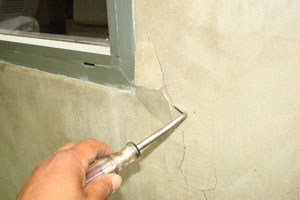LHC Newsletter Vol. 6, No. 5
“NEW LAWS FOR 2013”
By: David A. Loewenthal, Esq.
Robert D. Hillshafer, Esq.
During the last decade, those of us who are involved in the homeowner association field, i.e., property managers, Board of Directors and attorneys, have been inundated with substantial and significant changes in the law on an annual basis. For the first time in almost a decade, we can breathe a sigh of relief since the laws that have been enacted in 2012 will not significantly alter the method and manner in which most homeowners associations function on a daily basis. Rather, the new laws are generally limited to “clean up” i.e., clarifying or slightly modifying existing statutes. The biggest change to occur in the legislation is the entire overhaul of the Davis Stirling Act which will go into effect in 2014.
AB2273 — Notice to Association of Foreclosure:
As you will recall, a few years ago, the California legislature enacted Civil Code Section 2924(b) which has been known as a “Request for Notice” or a “Blanket Notice”. Specifically, this legislation was enacted to assist associations in promptly being able to bill a new owner of a property which was highly problematic as a result of the recent real estate collapse and the resulting voluminous lender foreclosures. Often times, lenders would foreclose on a property but fail to notify the Association of such a foreclosure, as well as not provide the name or contact information of the new owner which may have been the bank itself or a new third party owner.
Civil Code Section 2924(b) “Blanket Notice” allowed associations to record a “Request for Notice” which thereby requires a trustee to mail to the Association a copy of the Trustee’s Deed once a foreclosure sale has taken place. In addition, the trustee is obligated to mail a Deed within 15 days of recordation. As such, this law provided the Association with a methodology of determining when a lender had foreclosed on its lien which would thereby allow the association to begin billing the new owner of the property for assessments. Unfortunately, many lenders delayed the recordation of their Trustee’s Deed Upon Sale for extended periods of time following the trustee’s sale. As a result, the association would not timely learn of who the actual owner of the unit was and thereby impair their ability to collect assessments.
Pursuant to AB2273, if an association has recorded its “Request for Notice” pursuant to Civil Code Section 2924(b) prior to the Notice of the Default being recorded, the foreclosing lender has an obligation to provide a copy of the requested information to the association within 15 business days following the date of the Trustee Sale. In addition, AB2273 requires that the recordation of the Trustee’s Deed Upon Sale be recorded within 30 days of the sale.
The intent of AB2273 taken in conjunction with Civil Code Section 2924(b) is to help ensure that common interest developments can more rapidly update their records regarding ownership and thereby send their assessment billings to the correct owner after a foreclosure sale. Unfortunately, there is no penalty if the foreclosing lender fails to perform these functions, i.e., there is neither a monetary penalty nor any other penalty for the failure to comply with the law. Only time will tell whether this legislation actually has the desired effect. AB2273 is effective as of January 1, 2013.
SB880 – Electric Vehicle Charging Stations:
As you will recall, commencing on January 1, 2012, Civil Code Section 1353.9 went into effect pertaining to the installation of electric vehicle charging stations within homeowner associations. Unfortunately, almost immediately after its implementation, it was determined that there were issues involving the statute including inconsistencies with other Civil Code statutes, insurance related issues, etc. As a result of these issues, the California Legislature passed immediate clean up legislation, i.e., SB880 which went into effect on February 29, 2012.
One of the original flaws with Civil Code Section 1353.9 was that as written, it appeared to allow a Board, on its own, to grant to an owner of an electric vehicle exclusive use of the common area to install a charging station. However, this would have been violative of Civil Code Section 1363.07 which prohibits a board from granting exclusive use of a common area to an owner without the prior approval of 67% of the owners. SB880 revises Civil Code Section 1363.07 to specifically exempt the requirement that the membership vote and approve grants of exclusive use common area for electric vehicle charging stations under specific circumstances. As such, SB880 resolves this contradiction by confirming that the permitting of an electric vehicle charging station does not require 2/3 vote of the membership, but can be unilaterally granted by the Board of Directors.
Additionally, SB880 has revised Civil Code Section 1353.9, with respect to the installation of an electric vehicle charging station in an owner’s designated parking space. The revision to 1353.9 now states that any provision of an association’s governing documents are void and unenforceable if it either effectively prohibits or unreasonably restricts the installation or use of an electric vehicle charging station in an owner’s designated parking space including, but not limited to, a deeded parking space, a parking space in an owner’s exclusive use common area, or a parking space that is specifically designated for use by a particular owner.
In addition, with respect to the installation of an electric vehicle charging station in the common area for an owner’s exclusive use, an owner shall have a right to install in the common area an electric vehicle charging station for such owner’s exclusive use only if installation in the owner’s designated parking space is impossible or unreasonably expensive. In such cases, the association shall enter into a license agreement with the owner for the use of the space in the common area, subject to the owner’s duty to comply with the requirements of 1353.9(f), i.e., installation by a licensed contractor, proper insurance, approved plans, etc.
Further, with respect to the installation of an electric vehicle charging station in the common area for use of all members, either the association or owners may install such a charging station in the common area for the use of all members of the association and, in that case, the association shall develop appropriate rules for the use of the charging station. Also, an association may create a new parking space where one did not previously exist to facilitate the installation of an electric vehicle charging station.
As was true with the original laws passed pursuant to Civil Code Section 1353.9, an association can still impose reasonable restrictions on electric vehicle charging stations as long as such restrictions do not significantly increase the cost of the station or significantly decrease its efficiency or specified performance. Willful violations of this statute can make the Association liable to the applicant or other party for actual damages, as well as a civil penalty to the applicant or other party up to an amount of $1,000. Further, the prevailing party in any such enforcement action is entitled to the
recovery of reasonable attorneys fees.
In addition, an application for an electric vehicle charging station must be processed in the same manner as the association would process any other architectural request. Pursuant to Civil Code Section 1353.9, if an application is not denied in writing within 60 days from the date of receipt of the application, it will be deemed approved unless the delay is based upon a reasonable request for additional information from the association.
The law still allows an association to require as a precondition of approval that the applicant owner agree in writing to comply with the association’s architectural standards for installation of the electric vehicle charging station; that the applicant uses a licensed contractor to install the station; as well as pay for the electricity usage arising from the station.
A notable change in Civil Code Section 1353.9 pertains to insurance. Specifically, the association can still require that the owner provide within 14 days of approval of a request to install an electric vehicle charging station that they provide a certificate of insurance evidencing that the owner has in effect umbrella liability coverage in an amount of no less than $1 million which names the association as an additional named insured under such policy and that the policy must specifically state that the association is to be provided notice of any cancelation. Unfortunately, a modification arising out of SB880 is that an owner shall not be required to maintain such insurance for an existing National Electrical Manufacturers Association standard alternating current power plug. The NEMA is the most popular set of standards used in the United States and Canada for the construction of power cords and their respective connection. The NEMA plug and power cord connectors are organized by maximum power consumption requirements beginning with up to 15 amps at 125 volts all the way up to 50 amps at 250 volts.
SB880 does not change the duties and obligations of the owner and their successors regarding the maintenance, repair, damage arising from the construction and existence of an electrical vehicle charging station. In addition, the owner remains responsible for the cost of electricity arising therefrom.
Some associations are starting to create recordable covenants with the owners who wish to install electric vehicle charging stations setting forth all of the owners duties and obligations arising from the construction and maintenance of the charging station, as well as to place any future purchaser on notice of the continuing obligation.
AB1838 – Association Records:
Civil Code Section 1368 requires the owner of a separate interest, as soon as practicable, before transfer of title to the separate interest or execution of a real property sales contract thereof to provide various documents to a perspective purchaser. Such items include, but are not necessarily limited to, a copy of the governing documents of the association; a copy of any rental restrictions included within the governing documents; a copy of the most recent documents distributed pursuant to Civil Code Section 1365; a true statement regarding the amount of the association’s current regular and special assessments and fees; any monetary fines or penalties that have been levied upon the owners interest that are unpaid; a summary of any notices pertaining to alleged violations of the governing documents that remain unresolved by the current owner at the time of the request; a copy of the initial list of defects provided to each member of the association pursuant to Civil Code Section 1375; any approved changes in the current regular and special assessments and fees which are not yet due and payable; rental restrictions contained within the governing documents; copies of minutes if requested by the perspective purchaser.
In addition, pursuant to Civil Code Section 1368, the Association shall within 10 days of the mailing or delivery of the request, provide the owner of a separate interest or any other recipient authorized by the owner, with a copy of the requested documents. Upon receipt of a written request, the association shall provide on a form that is compliant with Civil Code Section 1368.2, a written or electronic estimate of the fees that will be assessed for providing the requested documents. The documents required to be made available pursuant to this section may be maintained in electronic form and may be posted on the association internet website. Requesting party shall have the option of receiving the documents by electronic transmission if the association maintains the documents in an electronic form. The association may collect a reasonable fee based upon the association’s actual costs for the procurement, preparation, reproduction and delivery of the documents requested pursuant to the provisions of this section.
Pursuant to AB1388 the document fee disclosure required by Civil Code Section 1368.2 must be in at least 10 point type font. In addition, associations may not charge a cancellation fee if documents are ordered for transmittal to a perspective buyer, if the work on the document order had not commenced prior to the cancellation of the order. Further, the association must refund all fees, except those fees for services rendered, prior to the cancellation of the request.
AB805 and AB806 – Davis Stirling Common Interest Development Act Rewrite Legislation and Relocation and Reorganization:
As everyone in the common interest development field knows, homeowner associations in California are governed by the Davis Stirling Common Interest Development Act which was adopted in 1985 and is codified in Civil Code Sections 1350 through 1378. For several years, the California Law Review Commission has been working to revamp the Davis Stirling Act and replace it with new laws that generally encompasses those statutes already in existence under the Davis Stirling Act and by attempting to organize the codes into a more logical format, as well as to remedy inconsistent provisions that exist within the act and add clarity. Though the Act was passed this year, it will not go into effect until January 2014. The new Act will commence with Civil Code Section 4000 et seq.
AB1720 – Access to Gated Communities by Licensed Private Investigators for Service of Process:
A long standing issue with respect to gated communities is who is allowed to enter the property for the purpose of process service. Civil Code Section 415.21 has historically applied only to registered process servers and grants access to gated communities upon four preconditions (1) the access is for a reasonable time; (2) access is for the purpose of performing lawful service or service of a subpoena; (3) the person must identify to the guard the person to be served, and (4) the person seeking access must display identification and appropriate evidence of being licensed.
AB1720 will extend these same conditions and allows access to licensed private investigators. It is also clear that the licensed private investigators are granted access to a gated community for the sole purpose of service and they are not allowed to conduct investigative work while entering the property for the purpose of service of process.
This new statute is consistent with the case of Bein v. Brechtel-Jochim Group, (1992) 6 Cal.App.4th 1387 where the Court of Appeals held that the service of legal process upon a guard at the entrance of a gated community is sufficient to meet the requirements for substituted service pursuant to Civil Code Section 415.20. The Court held in the Bein case that while “litigants have the right to choose their abodes, they do not have the right to control who may sue or serve them by denying them physical access.” In the Bein case, the Court of Appeals stated that after good faith attempts of physical service on the residence of the gated community had been unsuccessful, it was appropriate to allow substituted service on the residential gate guard pursuant to Civil Code Section 415.20.
As such, AB1720 is an important statute for those who live in gate guarded communities or condominium projects where access is controlled by a security guard.
Title III of the ADA – Pool Lift Rules:
An ongoing issue that plagues associations is whether or not the Americans With Disabilities Act (ADA) applies to them. This can come in the context of access to buildings via ramps, access and usability of bathrooms, common facilities and swimming pools. Recently, the U.S. Department of Justice (DOJ) published revised regulations regarding the ADA. This pertained to whether or not associations are required to install a lift on its swimming pool or comply with other ADA requirements. The issue is whether or not the facility, i.e., swimming pool in this case, is a “public accommodation”.
The Department of Justice’s ADA Technical Assistance Manual covering public accommodations in commercial facilities states as follows: “Although Title III does not apply to strictly residential facilities, it covers places of public accommodation within residential facilities. Thus, areas within multifamily residential facilities that qualify as places of public accommodation are covered by the ADA if use of the area is not limited exclusively to owners, residents and their guests.”
As such, if the association’s facilities are made available to the outside world, i.e., beyond owners, residents and their guests, those facilities may very well be required to be ADA compliant.
As an example, but without limitation, if the Association allows its pools to be used for area or high school swim meets, sells memberships for pool use, or has a clubhouse and rents it out to individuals outside of their owners, residents and their guests, then it is very likely that the ADA will in fact apply since it will have become a place of public accommodation.
If a component of the association is in fact deemed to be a place of public accommodation and the association fails to comply with Title III of the ADA, the association could become open to lawsuits by individuals for violation of Title III, as well as claims brought by the Department of Justice. It should be noted that under the ADA, the prevailing party in a lawsuit may recover attorneys fees and relief available under a DOJ enforcement lawsuit includes civil penalties not to exceed $50,000 for the first violation and $100,000 for any subsequent violation.
As such, if your association has a swimming pool and it has been made open as a place of public accommodation, you will likely be required to install a pool lift or other access points for disabled persons.
© 2012 by Loewenthal, Hillshafer & Carter, LLP. All rights reserved. Permission is granted to reproduce or transmit in any form any part of this newsletter as long as proper attribution to Loewenthal, Hillshafer & Carter, LLP is given. Due to the rapidly changing nature of the law, information contained in this publication may become outdated. As a result, layers and all others using this material must research original sources of authority.


